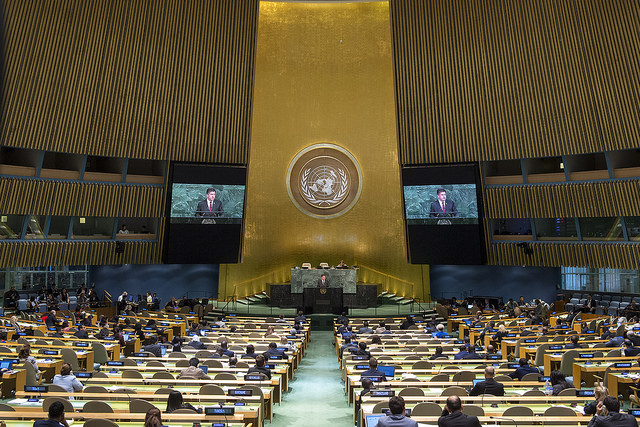Updated
Western Sahara: A December Meeting of the Parties? – Robert M. Holley

General Assembly Concludes Annual Debate Photo: United Nations
Robert M. Holley
October 5, 2018

Robert M. Holley, Senior Policy Adviser, MACP
Though “official Rabat” has been silent thus far, news reports from UN headquarters in New York and various Moroccan press sources seem to indicate that Morocco will attend the December “roundtable” meeting in Geneva to discuss how best to move forward on the Western Sahara.
Close observers can be excused if they find themselves somewhat confused by the latest developments as reported in the international media. Last April, the Secretary General’s new Personal Envoy, former German President Horst Kohler, announced that he intended to invite the Parties to a new official round of negotiations before the end of the year.
Reports from the UN this past week reveal that invitations have indeed been extended to Morocco, Algeria, Mauritania, and the Polisario to attend a meeting in Geneva in early December. However, that meeting is not being advertised as a new round of direct negotiations, the last of which took place in 2012. Instead, the meeting is being referred to as a “roundtable discussion” among the participants about how to format the future in dealing with this issue.
This is not a distinction without a difference. Immediately after Kohler ‘s announcement of his intentions last Spring, Morocco made very clear in official statements from the Foreign Ministry and its Mission to the United Nations that it would not agree to participate in any further round of direct negotiations that did not include Algeria as a direct participant in the process. There has been no statement from the Foreign Ministry to indicate that any change has been made in that position. This seems to explain why the December meeting is not being announced as a new round of direct negotiations. Moroccan press accounts also indicate that the Foreign Ministry will likely participate in the “roundtable” in Geneva, but may not be represented at Ministerial level.
At the same time, press reports also indicate that the Secretary General is asking the Security Council to renew the MINURSO mandate, set to expire at the end of October, for another year. A similar request was made by the Secretary General last April, but the Security Council would only agree to a six month extension amid reports that the US delegation in New York was disinclined to continue funding another peacekeeping mission that was not making demonstrable progress towards a resolution to the problem for which it had originally been created. Whatever the ultimate intentions of the US on the pending MINURSO mandate renewal, it should be noted that US contributions to the funding for this mission have previously been eliminated, then subsequently reinstated.
It is difficult to see just how Mr. Kohler is going to accomplish the task set for him to make “demonstrable progress” unless the Security Council is prepared to do something to break the current deadlock among the Parties. It is equally difficult to see how the Security Council is going to break its own deadlock over the Western Sahara question.
The US seems not to have a clear idea about how it wants to proceed. For the last decade it has been content to simply allow the status quo to be maintained, giving lip service to Morocco’s proposed autonomy initiative, but doing nothing that would demonstrate a clear resolve to move the Parties or the Security Council in that direction. France has clearly taken the position that it is not prepared to allow the Council to do anything that would do existential harm to its Moroccan partner. Neither the UK nor China has taken any firm stand other than to repeat their support for the “UN process.” No Permanent Five member of the Council has been obliged, up to this point, to impose its veto power over any prospective course of action. Observers assume that Russia would block any move to in the Council that might satisfy the Moroccan insistence that Algeria be included as a direct participant in the next round of “direct negotiations” as long as Algeria itself insists that it is only an interested observer in the conflict.
So for now, the talking continues even though it still seems to be going in circles. Washington seems to hold the key to breaking the deadlock, but other than cutting the UN peacekeeping budget, it is difficult to determine to what further extent, if any, it may really care about this problem.